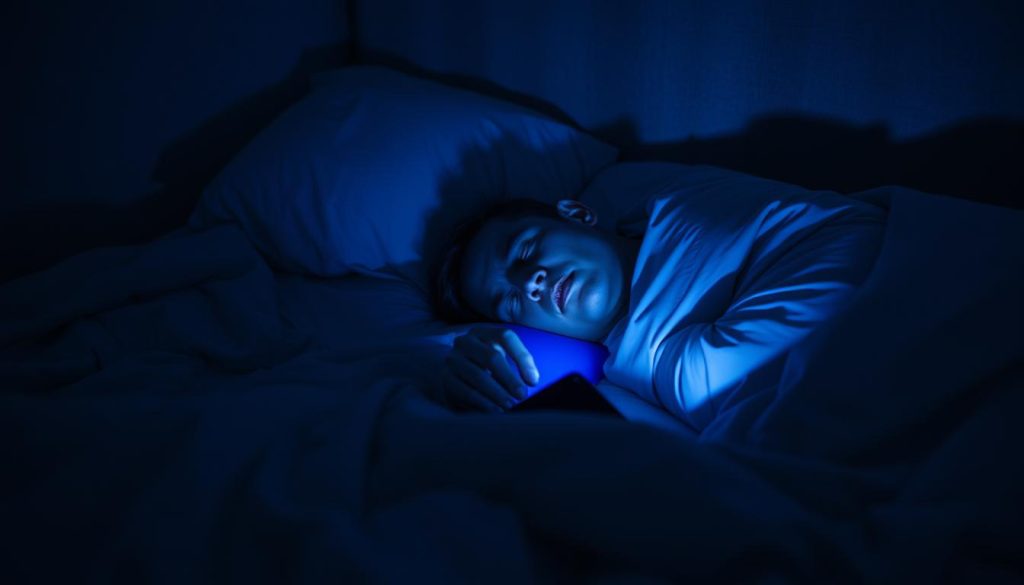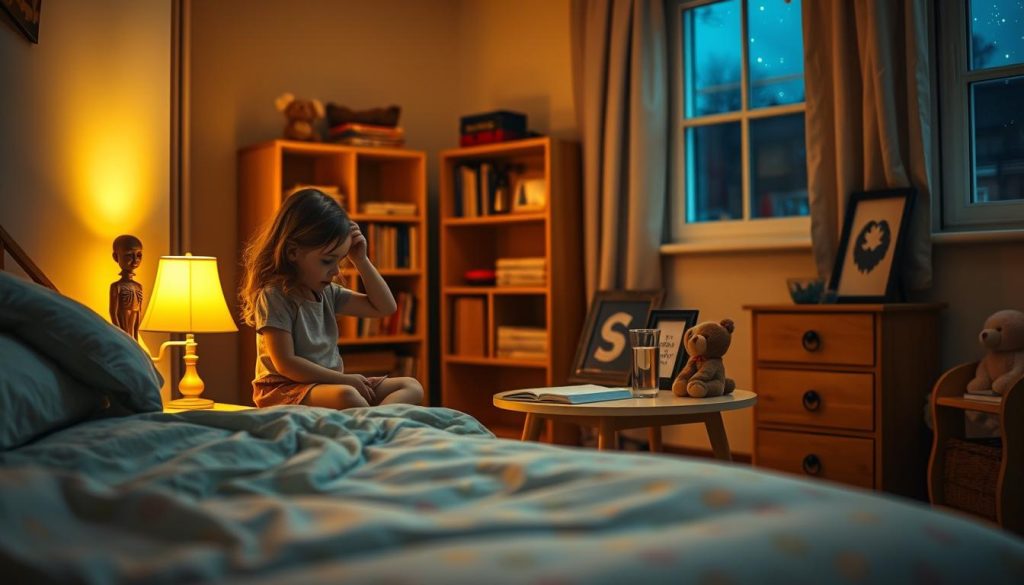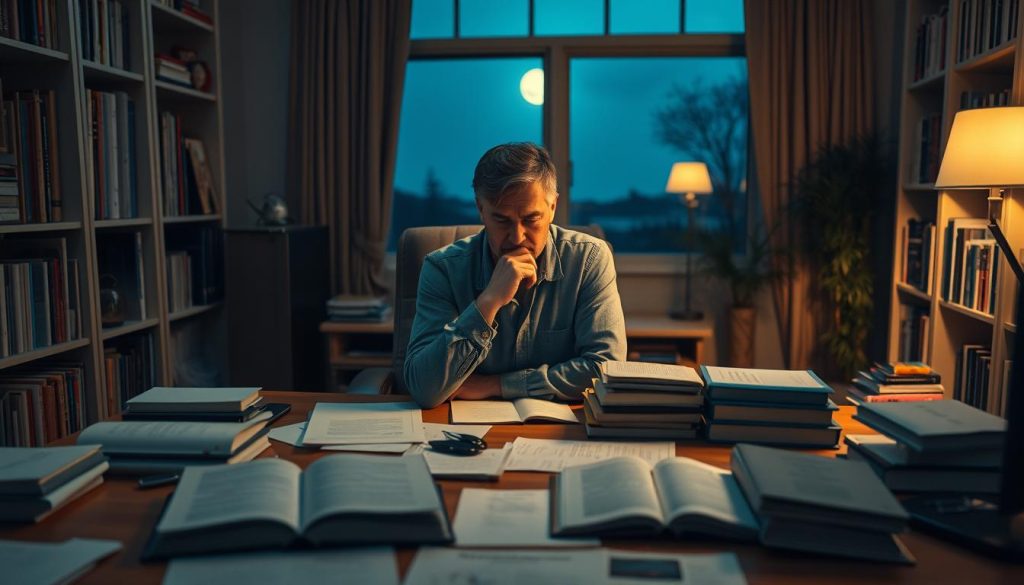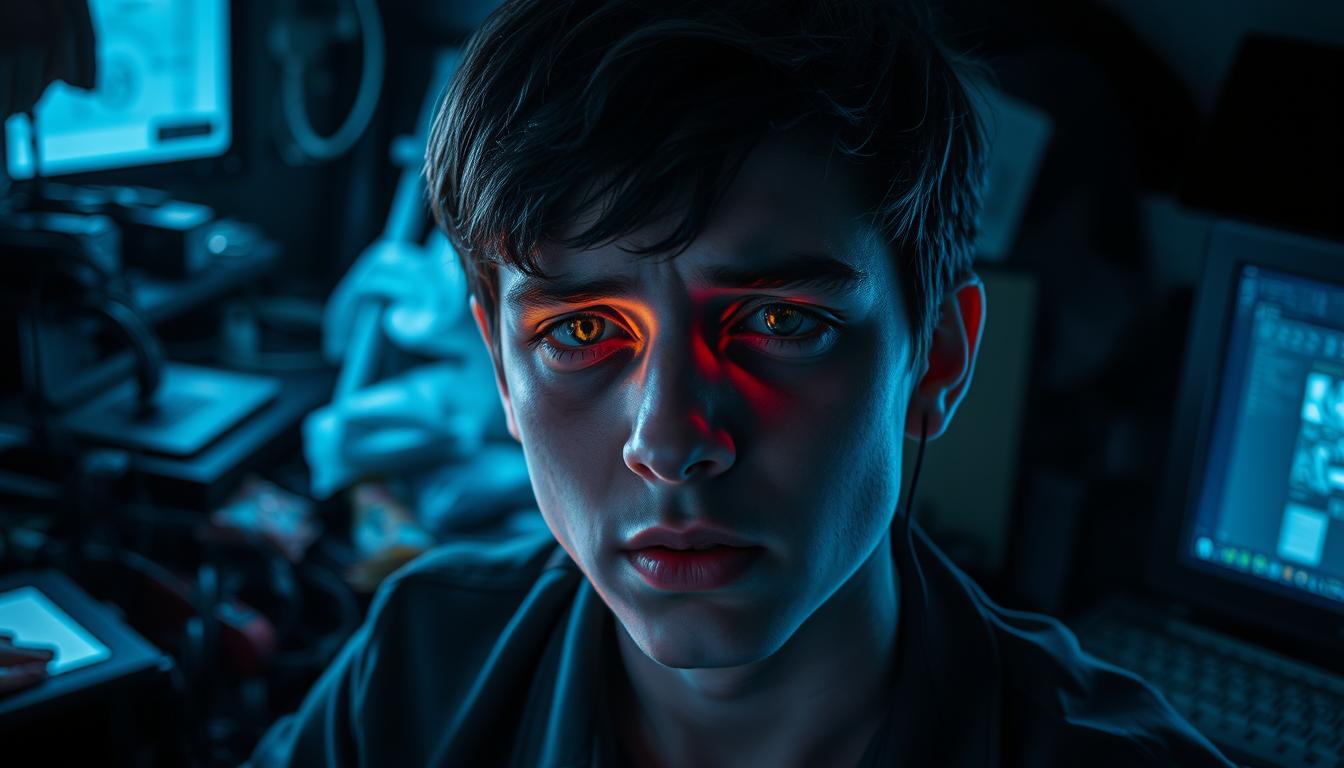The debate about screen time before bed has grown. Our lives are now more connected to electronic devices. It’s important to look at how these devices affect our sleep and health.
Knowing how screen time affects different ages helps us use devices wisely. This knowledge is key to better managing our electronic use.
The Science Behind Blue Light Exposure
In today’s world, we can’t avoid blue light. It comes from our phones and laptops. It’s important to know how blue light affects us.
What is Blue Light?
Blue light is a high-energy light in the visible spectrum. It’s found in sunlight and artificial lights like LEDs. This makes it a big part of our lives today.
How Blue Light Affects the Brain
Our brains are sensitive to blue light, especially at night. It affects melatonin, the sleep hormone. This can disrupt our sleep and lead to sleep disorders.
Research Studies and Findings
Many studies have looked into blue light’s effects. Harvard Medical School found it can harm sleep quality. Even a little blue light in the evening can mess with our sleep.
| Research Study | Key Findings |
|---|---|
| Harvard Medical School | Blue light exposure delays melatonin production and shifts sleep patterns. |
| University of Toronto | Blue light blocking glasses can mitigate the circadian rhythm disruption caused by blue light exposure. |
| American Medical Association | Chronic exposure to blue light can lead to various health issues, including insomnia and mood disorders. |
Impact on Sleep Quality
Using digital devices before bed is a growing concern. It can greatly affect sleep quality. This leads to disrupted sleep patterns and health issues.
Mental and Physical Effects
Looking at screens before sleep can harm both mind and body. It can make you feel stressed and anxious. This makes it tough to relax and fall asleep.
The blue light from screens also stops melatonin production. Melatonin is key for sleep cycles. This results in trouble falling asleep and poor sleep quality.
Case Studies and Real-Life Examples
Many studies and examples show how digital devices affect sleep. A Harvard Medical School study found that reading on electronic devices before bed worsens sleep. People who read printed books fell asleep faster and slept better.
Teenagers who use smartphones a lot at night also face sleep issues. This can lead to feeling tired during the day and lower grades.
Common Digital Devices and Their Effects
Digital devices are a big part of our lives now. It’s key to know how they affect our sleep. Smartphones, tablets, and computers each have their own ways of disrupting sleep. Let’s look at how they differ and why using them at night is a problem.
Smartphones
Smartphones are everywhere, and many of us use them late at night. This can mess with our sleep because of the blue light they give off. Looking at emails, social media, or news before bed keeps our brains awake. It’s hard to relax and fall asleep after that.

Tablets
Tablets are like smartphones but also for fun and work. Watching videos, reading books, or doing projects on them before bed can really mess with sleep. Their bigger screens might give off more blue light, which can stop melatonin production. This hormone is key for sleep, affecting how well and long we sleep.
Laptops and Desktops
Laptops and desktops are important for work and fun. But, they can keep us awake at night. Activities like gaming, making presentations, or watching shows can keep our minds active. Plus, sitting for these activities makes it hard to relax and sleep.
Screen Time Before Bed: Myths vs. Reality
It’s important to know the truth about screen time before bed. Many think all digital activities hurt sleep quality. But, the real effect of screens on sleep is more complex. Studies show that blue light from screens can affect melatonin levels, but how much it impacts sleep depends on personal sensitivity and screen use.
One myth is that all electronics are bad for sleep. But, research shows smartphones might affect sleep differently than bigger devices like laptops or tablets. This shows how important it is to look at how we use screens before bed.
Also, what we do on screens matters. Reading an e-book in night mode might not hurt sleep as much as scrolling through social media. So, to understand the impact of screens before bed, we need to look at both the device and how we use it.
To make things clearer, let’s compare different screens and their effects on sleep:
| Device | Potential Impact on Sleep | Notes |
|---|---|---|
| Smartphone | Can inhibit melatonin production | Small screen close to face |
| Tablet | Moderate impact | Larger screen may be held further away |
| Laptop/Desktop | Varies | Dependent on screen settings and usage duration |
Understanding the impact of digital screens on sleep means seeing the differences between devices and how we use them. This helps us make better choices about our tech use at night.
Psychological Consequences of Sleep Disruption
It’s important to understand how sleep disruption affects our minds. This is especially true when we spend too much time on screens before bed. Not getting quality rest can harm our mental health.
Studies show that too much screen time before bed can lead to anxiety and depression. It changes how our brain works, affecting our mood and thinking skills.
Not sleeping enough can make it hard to remember things, focus, and solve problems. Our brain struggles to handle information and remember things when we’re tired. This shows why it’s key to balance screen time and choose wisely before bed.
In short, the harm to our mental health and brain from disrupted sleep is real. By knowing these risks, we can take steps to protect our minds. This ensures we get the sleep we need for good mental health.
Establishing a Healthy Bedtime Routine
Creating a restful bedtime routine is key for better sleep and health. A consistent routine and screen-free areas can greatly improve your sleep quality.
Creating a Screen-Free Zone
One great way to relax before bed is to make a screen-free area. Choose a spot in your home, like the bedroom, where no digital devices are allowed. This helps your brain know it’s time to sleep.

Incorporating Relaxation Techniques
Instead of using your phone or watching TV, try relaxation techniques. Deep breathing, meditation, and gentle stretching are great options. They calm your mind and body, making for a better night’s sleep.
Tackling Smartphone Usage Before Bed
It’s important to control phone use before sleep to keep your sleep good. Setting digital limits can really help improve how well you sleep.
Setting Limits and Boundaries
Setting digital limits for sleep means making rules for phone use. Try to stop using phones an hour before bed. This tells your brain it’s time to relax.
- No phones at least one hour before bed.
- Use features like “Do Not Disturb” to avoid notifications.
- Keep the smartphone out of reach—from another room, if possible.
Using Night Mode and Other Features
Night mode settings help cut down on blue light. Apple’s Night Shift and Android’s Blue Light Filter change the screen to warmer colors. These are better for your eyes and don’t mess with melatonin.
| Feature | Platform | Function |
|---|---|---|
| Night Shift | iOS | Adjusts screen to warmer colors |
| Blue Light Filter | Android | Reduces blue light exposure |
| Do Not Disturb | iOS / Android | Blocks notifications during set times |
Using these tips can help you control phone use before bed. This makes it easier to get a good night’s sleep.
Alternative Activities to Digital Devices
Switching to non-screen activities can be both fun and helpful. It improves sleep quality and boosts mindfulness before bed.
Reading Books
Reading physical books is a calming way to end the day. It lets you dive into another world and get ready for sleep. Choosing books over e-readers also cuts down on blue light, which can mess with sleep.
Meditation and Deep Breathing
Meditation and deep breathing can make bedtime better. Meditation calms your mind and lowers stress, helping you sleep. Deep breathing eases tension and relaxes you. Regular practice can change bedtime into a time for rest and renewal.
| Alternative Activity | Benefits |
|---|---|
| Reading Books | Enables better sleep, reduces blue light exposure, and provides a relaxing end to the day. |
| Meditation | Promotes mindfulness, reduces stress, and aids in mental relaxation before bed. |
| Deep Breathing Exercises | Helps alleviate tension, enhances relaxation, and prepares the body for a peaceful sleep. |
Expert Opinions on Screen Time Before Sleep
Health professionals share their views on how screen time impacts our sleep. Psychologists and doctors agree it’s key to manage screen time before bed.
Psychologists’ Viewpoints
Psychologists say screen time before bed can raise anxiety and mess up our calm-down routines. They suggest cutting down on screens at least an hour before sleep. Activities like reading or doing something calm can help get your mind ready for bed.
Medical Doctors’ Advice
Doctors talk about the health problems caused by too much screen time before bed. They point out that blue light can mess with our sleep cycle by affecting melatonin. Most doctors recommend using blue light filters or night mode on devices to reduce sleep disruption.

Impact of Screen Time on Children
Today, kids live in a world where screens are everywhere. It’s important for parents to know how screens affect their kids’ sleep and health. Here, we’ll share some key stats and tips for parents.
Children’s Screen Time Statistics
Studies show kids are spending more time on screens than ever before. This has parents worried about its effects on sleep and health. Let’s dive into the numbers:
| Age Group | Average Screen Time Per Day | Percentage of Children Experiencing Sleep Issues |
|---|---|---|
| 0-2 years | 2 hours | 25% |
| 3-5 years | 3 hours | 30% |
| 6-12 years | 4 hours | 40% |
| 13-18 years | 7 hours | 50% |
Recommendations for Parents
Parents need to guide their kids on screen use to help them sleep better. Here are some tips:
- Make a daily routine that cuts down on screen time before bed.
- Encourage reading or physical activities instead.
- Use parental controls to keep an eye on screen time.
- Make bedrooms screen-free zones.
- Limit your own screen time and focus on family activities.
By following these steps, parents can help their kids avoid the bad effects of too much screen time.
Technological Solutions to Reduce Harm
Screen time is a big part of our lives. Finding ways to reduce its impact on sleep is key. Blue light blocking glasses and screen dimmer apps are great solutions. They help make our sleep environment better by cutting down on digital device harm.
Blue Light Blocking Glasses
Blue light blocking glasses help reduce screen time’s negative effects on sleep. They filter out blue light from screens, easing eye strain and helping you sleep better. Brands like Warby Parker and Gunnar Optiks offer stylish and effective options.
For those who can’t avoid screens at night, these glasses are a lifesaver.
Screen Dimmer Apps
Screen dimmer apps are another way to improve sleep. They change your device’s screen color to a warmer, less harsh light. Apps like f.lux and Twilight adjust brightness based on the time, reducing blue light at night.
Using these apps can make your nights more restful. They help you sleep better by reducing the disruption of your sleep cycle.
Personal Anecdotes and Experiences
Many people have shared their sleep stories, showing how screen time affects their sleep. Jessica, a software developer, noticed better sleep after cutting down on screens before bed. She started reading instead, which helped her sleep deeper.
Sam, a college student, talked about how late-night TV messed up his sleep. He felt tired in class. Sam set a digital curfew and now does journaling or listens to music before bed. This has greatly improved his sleep and focus.
These stories show how screen habits can really affect sleep. By changing their screen time, many people have improved their sleep and well-being. These experiences remind us of the benefits of less screen time before bed.

